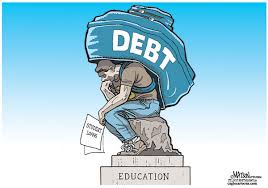The Effects of Student Loans
May 01, 2023
This paper explores the various effects of student loans on college students including financial, psychological, and academic impacts.
Financial Effects: Student loans can often be a large financial burden for many college students who have to pay back their loans after graduation. According to a survey from the Institute for College Access & Success (TICAS), over 70% of college seniors had student loan debt in 2016 and the average amount was around $30,000. This can mean that students are paying off their loan payments for years after they graduate, leaving them with less money to put towards other life goals like buying a house or starting a business. Furthermore, high interest rates on certain types of loans may lead to even more debt if not paid back quickly.

Psychological Effects: There can also be psychological effects of student loans on students. Students may feel overwhelmed by the amount of debt they have to pay off, leading to stress and anxiety. This can interfere with their daily lives and put a strain on their mental health. Additionally, having so much debt looming over them may cause students to make decisions such as taking lower-paying jobs or forgoing career opportunities because they are trying to pay back their loans first.
Academic Effects: Student loan debt can also impact a student’s academic success. With the financial burden of paying back loans, many students may be forced to work more hours in order to make ends meet while neglecting their studies and other school commitments. This could lead to poorer academic performance and an overall decrease in college completion rates.
In conclusion, student loans can have a major impact on many aspects of a student’s life. It is important to be aware of the potential consequences that come with taking out loans and to research options for repayment plans so that students can make sure they are making the best decision for their future.
